- Learning time
- 5 minutes
- First play time
- 20 minutes
Hanamikoji
Designed by: Kota Nakayama
Hanamikoji is, according to the rules supplied with this elegant little card game, the most well-known geisha street in the old capital of Japan – and the theme here is winning the favour of seven famous geishas.
It’s a two player game, and to set up, the seven geisha cards are placed in a row between the players. Each has a different colour, and their values range from 2 to 5 – these are the points you will win if you control them at the end of the round.
There is a deck of 21 cards, and there are as many cards as the number of points for each geisha (so two for each two point geisha, three for the three pointers etc). These are shuffled, and players are dealt a starting hand of six cards – one of the remaining cards is put back in the box unseen, and the remainder form a draw deck.
Each player will now get four turns each, alternating, to draw a card and then play cards – after which the points for control will be assessed, to see if someone has met the winning conditions.
The twist (there’s always a twist) is that you can’t simply play cards to your side of the row. You have four tiles numbered one to four, and each turn you’ll choose one of these to activate. The one allows you to choose one card from your hand to secrete, which will be added to your side at the end of the round. The two lets you secrete two cards which will be out of the round entirely. The three lets you play three cards face up; your opponent will take one and add it to their side, and you’ll take the other two and do likewise. The four lets you offer two groups of two cards – your opponent gets one, and you then get the other.
The fact that you can choose which order you do these actions in, and not knowing what cards are left in the deck and which have been removed from the game, make for some deliciously agonising decisions. Once all tiles are played and hidden cards have been revealed, favour is assessed. If both players played an equal number of cards (or none) to a geisha, she remains neutral; if one player played more cards, they win the favour of that geisha. If either player has won the favour of four geishas, or totalled 11 points, they win.
Should there be no outright winner, you’ll play a second and maybe even a third round, with one extra clever rule. You use tokens to show which geishas currently favour which player, and in subsequent rounds, if the players draw for favour of these geisha, their allegiance will remain with the player who currently controls them. This adds an extra imperative to subsequent rounds – it’s now no longer enough to force a draw.
One word seems especially apt in describing Hanamikoji: elegant. The artwork is very pretty and sophisticated, and the gameplay is smoothed at every turn by the intuitive nature of the rules: the tiles numbered one to four let you play one to four cards respectively, and the number of the geisha tells you how many cards in the deck belong to her. It all adds up to an extremely enjoyable game that offers a lot of punch in a small box.
Joe says
This is a delight! Very intuitive and easy to teach, so pretty to look at, and some really tough decisions in a short time frame. There's enough luck in the card draws that sometimes you'll be making the best of a bad lot, and other times your opponent won't stand a chance - but more often you'll both be in with a shot and the player who can out think the other will win. It feels as though some very satisfying bluffing and misdirection could come in to play too, if you play with a regular partner.
The guru's verdict
-
Take That!
Take That!
The usual zero-sum back and forth that you get with two player games - not vindictive at all.
-
Fidget Factor!
Fidget Factor!
Your first choices can be agonising, but you won't ruminate forever, and it's only a 20 minute game at most.
-
Brain Burn!
Brain Burn!
The game is so elegantly put together it really helps players assimilate the information in front of them. And there are only 21 cards in the whole game in any case.
-
Again Again!
Again Again!
A very more-ish game that you could play a few times in a row without getting bored. A great game to take to the pub too!

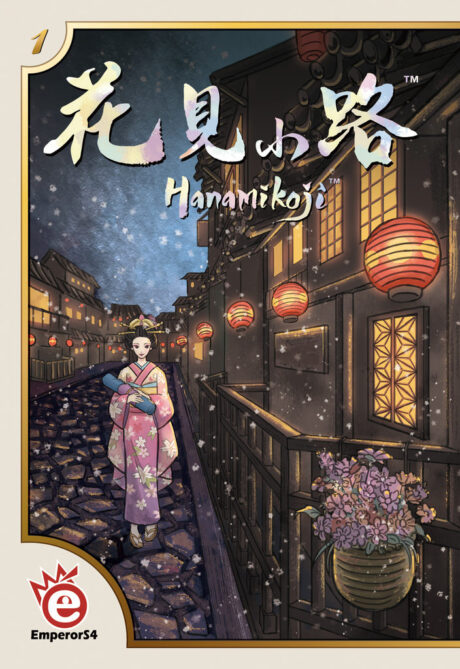
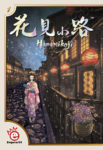
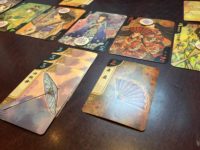
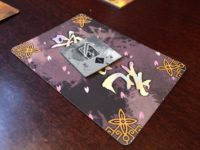
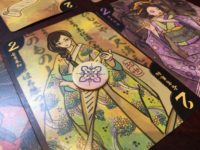
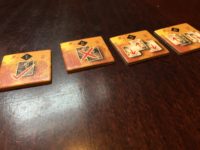


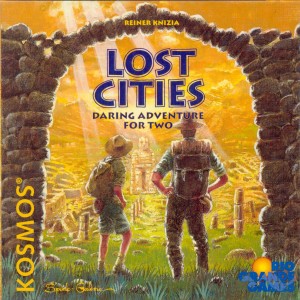
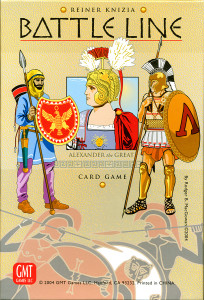
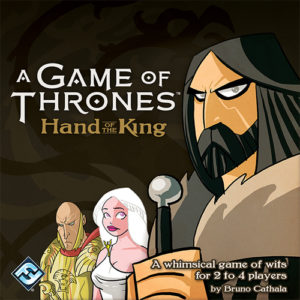
Sam says
I like the artwork, and the slightly inscrutable gameplay reminds me a little of King of Siam. It's a bit of a head-scratcher and an ideal one to play at lunchtime or over a coffee. Some luck, but as Joe says below, some really interesting decisions too.